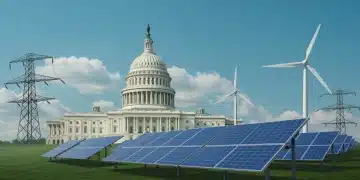Senate GOP tax bill cuts clean energy credits

The Senate GOP tax bill cuts clean energy credits significantly, jeopardizing investments in renewable energy and potentially hindering job creation and technological innovation in the sector.
Senate GOP tax bill cuts clean energy credits, leaving many wondering how these changes will affect the future of renewable energy in the U.S. Have you considered what this means for our planet and economy? Let’s dive into the details.
Overview of the Senate GOP tax bill
The Senate GOP tax bill has sparked widespread discussion, especially regarding its implications for clean energy. This legislation includes several key changes that aim to reshape tax structures across various sectors, with significant consequences for renewable energy investments.
Key Features of the Bill
One major aspect of the bill is the proposed cuts to clean energy credits. These changes could drastically reduce financial incentives for companies focusing on sustainability.
- Elimination of existing tax credits for solar and wind energy.
- Reduction in supporting policies for clean energy innovation.
- Increased tax liabilities for renewable energy companies.
The effects of these cuts may disrupt progress in transitioning to renewable energy sources. Without financial support, many businesses may struggle to maintain momentum in their clean energy projects.
What This Means for the Future
Future investments in clean energy depend heavily on government policies like these. The repeal of tax incentives not only jeopardizes current projects but also hampers future initiatives. This will likely result in a shift back to more traditional energy sources, which could slow progress in combating climate change.
Concerns are growing among environmentalists and industry leaders about the long-term ramifications of the bill. Will we be able to achieve our environmental goals without these crucial credits?
Key changes to clean energy credits

The key changes to clean energy credits introduced in the recent Senate GOP tax bill are set to transform the landscape of renewable energy financing. These alterations are crucial for understanding the implications for both current and future projects.
Overview of Changes
First, the proposal aims to significantly reduce financial incentives for solar and wind energy. Many companies have relied on these credits to grow their businesses and invest in innovative technologies.
- Removal of tax credits for solar panel installations.
- Cuts to wind energy tax incentives, impacting profitability.
- New limitations on eligibility for remaining credits.
These drastic adjustments could hinder progress in reducing dependency on fossil fuels. As renewable energy projects face increased costs without credits, the shift back to conventional energy sources may become more attractive.
Effects on the Industry
With the potential loss of clean energy credits, the entire industry may experience a significant downturn. Companies might prioritize short-term financial stability over long-term sustainability goals. Investors could become wary, leading to decreased funding for future renewable projects.
The ripple effect of these changes can also impact job creation and technological advancement in the clean energy sector. As companies reassess their strategies, job opportunities may dwindle, discouraging skilled professionals from entering the field.
Potential impacts on renewable energy investments
The potential impacts on renewable energy investments due to the proposed changes in the Senate GOP tax bill are significant. With the reduction of clean energy credits, many investors are reconsidering their commitments to renewable projects.
Financial Uncertainty
The uncertainty created by these changes could lead to a hesitance among potential investors. Many are questioning whether financing renewable projects will yield sufficient returns. As tax incentives diminish, project feasibility may also decline.
- Decreased attraction for new investors looking to enter the market.
- Higher risk perceived in completing renewable energy projects.
- Potential reallocation of funds to fossil fuel investments instead.
This financial uncertainty does not only hurt new investments but also threatens existing projects. Developers may find it challenging to secure the necessary capital to continue operations without government support.
Impact on Innovation
Innovation is crucial for the advancement of renewable energy technologies. The reduction in funding could slow down research and development efforts. Companies might delay or cancel projects that require significant upfront investments but promise long-term benefits.
Without government backing, there is a risk of stagnation in the clean energy sector. Companies may struggle to advance technologies that could improve efficiency and decrease costs.
Moreover, the loss of incentives could discourage startups from launching in the renewable space. New ideas need funding and support, and the absence of credits could stifle creativity and progress.
Public and expert reactions to the bill

The public and expert reactions to the bill have been mixed, with many expressing concern over the proposed cuts to clean energy credits. These reactions highlight the potential negative consequences of the Senate GOP tax bill on renewable energy initiatives.
Public Concerns
Many members of the public are worried about how these changes will affect the environment. As awareness of climate change grows, people are anxious about losing the incentives that encourage sustainable practices. Without support, many fear a regression in clean energy progress.
- Activists are voicing their frustrations regarding the bill.
- Some community leaders are organizing campaigns to raise awareness.
- Public opinion polls show declining support for the bill among environmentally conscious voters.
These public concerns are often echoed in local community discussions, emphasizing a desire for more robust commitments to renewable resources and energy independence.
Expert Opinions
Experts in energy policy and environmental science are weighing in, and many are speaking out against the proposed cuts. They argue that reducing financial incentives for clean energy could halt advancements that are critical for reducing greenhouse gas emissions.
According to several studies, experts claim that a strong renewable energy sector is essential for future economic stability and environmental sustainability. The consensus suggests that without proper incentives, the transition to cleaner energy sources may face significant setbacks.
Additionally, many experts believe these changes could hinder technological innovation in the sector. As renewable energy technologies develop, the lack of funding could stifle new ideas and further exploration.
The proposed Senate GOP tax bill poses significant challenges for the future of clean energy. As we have seen, cutting key tax credits could slow investment into renewable energy projects, impacting job creation and environmental progress. Public concern is rising as people fear losing important incentives for sustainability. Experts echo these worries, pointing out that reduced funding may hinder innovation and technological advancements in the sector. It is crucial for policymakers to consider these potential outcomes carefully, as our future energy landscape and environmental health depend on it.
FAQ – Frequently Asked Questions about the Senate GOP Tax Bill and Clean Energy
What are the main changes in the Senate GOP tax bill regarding clean energy credits?
The bill proposes significant cuts to financial incentives for solar and wind energy, which could affect investments in these renewables.
How might these changes impact job creation in the renewable energy sector?
The reduction of clean energy credits could lead to fewer job opportunities as companies may stop or slow down their hiring and projects.
What concerns are being raised by the public and experts about this bill?
Many people express worries about the environmental impacts, while experts highlight that reduced incentives may hinder innovation in renewable technologies.
How can investments in renewable energy be affected by this bill?
Investors may become hesitant to fund renewable projects due to increased financial risks and uncertainties created by the proposed cuts to incentives.





